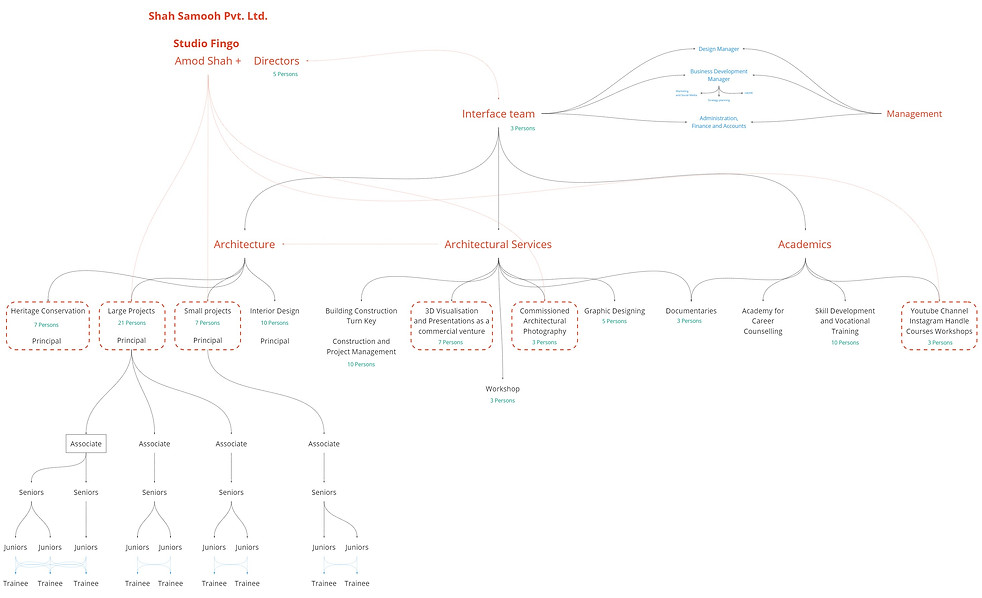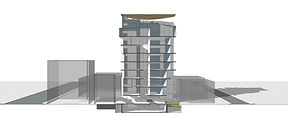READINGS
REFLECTING ON PREVIOUS ACADEMIC PROJECTS
CHANGE
Analyzing the various characteristics of design like form, spaces, movement, axes, and structure across the projects, here are a few observations:

Over several years, the process had become streamlines. At first glance after analysis, the process did appear generic, on deeper inspection, realized the relationship between the initial sketches, the development process and the product. The essence of the primary sketch/idea remain in the product. The following are observation from the design processes followed in academic projects:

INTERVIEWS
This involved studying various models of practices across the country, understanding the various aspects of practice and their practical application. There were observation and learnings from every interview. Out of the practices, the following were the closest I would imaging studiofingo's structure and functioning would get to are Archohm, Studio Lotus and Essteam. The scale of operations and outreach is an inspiration. A re-discovery of how the practice in most cases reflects the leaders personality, how management and communication ca make all the difference in running a practice and how people centric approach can change the sense of ownership and allow them to stay in the same practice for a long time. For more information on the practices interviewed, please visit thepracticecept.com
Studio Notes
DISCOVERING AND DEVELOPING THE IDEOLOGY
What is good design for you? What are your core values? What are the non negotiables? What really is ideology? These are a few of the many questions that surfaced while wording the ideology. The following is the ideation and the process:
Drawing from the readings, and the interviews of several distinct practices while looking back into previous academic projects, it was an interesting journey in discovering the core values and the belief in the practice. Assimilating these thoughts, deciphering between what is an aspiration and a responsibility, the ideology of studiofingo was derived:
ARRIVING AT THE IDEOLOGY

The most important thought at studio-fingo is to always negotiate for the greater good, to explore how one can give back.
The design approach will be two-fold:
Firstly, in addition to responding to the immediate needs of the end-user and the project-brief, architecture should give back positivity, by nurturing growth, generating happiness and ensuring well-being.
Secondly, architecture should not merely respond to the context, but also be able to positively contribute and add substantial value to it.

STRUCTURE OF PRACTICE
In the process of structuring the Practice various factors were considered link, types of projects, nature of practice, management, scale of operation, number of employees, roles and responsibilities, sublimation, crass-subsidization, inter-relationship of practice-academics-research.. A large part of the inspiration for structuring of the practice was drawn by learning from that of Archohm's Practice.

STANDARDISATION
A workflow diagram is developed for typical architectural design projects. These become the basic SOPs for such projects. These are adapted and tweaked to suite the nature of the project. This was experimented with for the academic projects and also attempted in live projects. Along with this, a work flow chart for a 2 Week sprint was designed and experimented. Both of these flowcharts looked very promising on paper, with the real life application, we realized that a lot more is governed by time. A series of modifications need to be done to optimize this process further.

Standard Operation Procedure for Architectural Design Projects

Two Week Sprint for Project Workflow
PROJECTS AND TIMELINE
The studio has three projects: the first, a competition project - Alps Wellness Retreat, attempting collaboration between two practices, second, a self initiated project - Fingo Collective, attempting complete application of ideology, and the third, a project that challenges the ideology - Honest Residence.
In addition to these, three more live projects were experimented with: A residence in collaboration with Green Tree Architects - Tirupur Residence, an Architectural Photography Project - Hayagreevadhama, and a Research and Documentation project - Flashback.
The following is how the projects were divided into tasks and scheduled in coherence to each other:

Various tasks listed for each project

Tasks distributed on a timetable
APPLICATION IN ACADEMIC PROJECTS

A center for health and wellness situated in St. Mortiz, on the foothills of the Swiss Alps, facing the Lake St. Moritz.
Description

Situated in Bengaluru, Fingo Collectives is hub for creative professionals across the globe. A center that nurtures growth of young practices and creative minds
Project Report

A residence in Mumbai for the owner of a renowned Pav Bhaji brand. Situated in Andheri West, on the banks of the Andheri Link Road (with a metro line), and is abutted by police quarters on one side and by a 11 story tower on the other.
An external collaboration with KOSH STUDIO, where five individuals were involved in the project.
Nature of project
Initial Sketches

A self-initiated project envisioned by and largely designed and developed by Amod Shah

Internal Collaboration with the project envisioned by and largely designed and developed by Apoorva V


APPLICATION IN LIVE PROJECTS
Design of a residence at Tirupur. The client being an Executive director in a renowned Company in Tamil Nadu. A site area of more than 35,000, in a gated community.
Description
An visual documentation of a residential renovation by Pinwheel Projects.
An architectural documentation project, aiming to create a virtual time-space from a certain point in history.
An external collaboration with Green Tree Architects, a 20+ year old practice, wish which Amod Shah has been associated since 2017.
Nature of project
Architectural Photography project. Completing the shoot with a team involving Amod Shah, Manasa Kanade and Udit Shah
A Research Project, in collaboration with Urban Blok 3D by Tushar Ganesh and Vinyas Vardhan, who envision to create a commercial venture with this.

CONCLUSION
Looking back in hindsight at these experiments, a comparison between what was imagined the nature of practice to be and what was observed in the virtual operation corms a strong basis for understanding how we can proceed. The following is a chart of dualities. where the base layer is representing the inclinations prior to initiating the projects.

